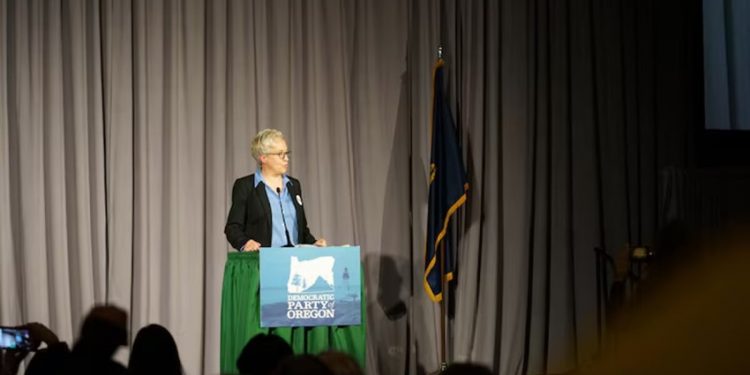Astoria, OR – A month after the election of Donald Trump to a second term as president, Oregon’s top Democratic leaders have started to discuss how best to safeguard the state’s progressive values against potential federal policies that could conflict with Oregon’s laws. Governor Tina Kotek, along with other statewide officials, has begun laying the groundwork for a coordinated response to what they anticipate will be a tumultuous political landscape under a second Trump administration.
On Monday, Kotek met with key state officials, including Attorney General-elect Dan Rayfield, Secretary of State-elect Tobias Read, Treasurer-elect Elizabeth Steiner, and Labor Commissioner Christina Stephenson, to start formulating a strategy. The group, which also included House Speaker Julie Fahey and Senate President Rob Wagner, gathered behind closed doors during a business conference in Portland to discuss how their respective offices could work together to uphold “Oregon values” in the face of federal changes.
A spokesperson for Kotek emphasized that the meeting was primarily focused on ensuring that the state’s leaders were on the same page as they prepare for potential challenges in the coming years. “They discussed the distinct role of each of their respective offices in affirming Oregon values, ensuring a functioning democracy, and delivering results for Oregonians,” said Kotek’s spokesperson, Elisabeth Shepard. “They also identified points of contact within each office for ongoing, deliberate coordination and information sharing as the incoming federal administration takes shape.”
While specifics remain unclear, the potential consequences of a second Trump administration for Oregon could be far-reaching. Trump has already signaled that he intends to pursue aggressive policies, particularly on issues like immigration, tariffs, environmental regulations, and voting rights, that could directly challenge the state’s policies.
One area of concern is immigration. Trump has previously spoken about ramping up deportations and withdrawing federal support from sanctuary cities like Portland, which limits local cooperation with federal immigration enforcement. Oregon, which has been a staunch advocate of immigrant rights, could find itself in a direct conflict with the federal government on this issue.
Trade policies are another area where Oregon could feel the pinch. The state’s economy, which is heavily reliant on international trade, could be impacted by new tariffs that Trump has proposed. This would present significant challenges for industries such as agriculture and technology, which depend on free trade and open borders for exports and imports.
Environmental protections, a cornerstone of Oregon’s policy agenda, could also come under threat. Trump has rolled back numerous environmental regulations during his first term, and many fear he may continue those efforts, undermining Oregon’s ambitious climate change policies. The potential elimination of federal funds for clean energy initiatives could be particularly damaging to the state’s green energy transition.
Perhaps the most immediate concern for Oregon’s Democrats is the possibility that Trump will seek to restrict voting rights. Trump has suggested ending mail-in voting, which is a popular and widely-used method of voting in Oregon. A federal push to curtail or eliminate vote-by-mail could disrupt Oregon’s elections and create confusion for voters.
While many Democrats across the country have taken a cautious approach in the aftermath of the election, Oregon’s leadership is already beginning to prepare for legal battles. One of the most critical figures in these efforts will be Dan Rayfield, the incoming attorney general. Rayfield’s office will be pivotal in defending Oregon’s laws and values in court, especially if the Trump administration attempts to impose policies that conflict with state legislation.
In preparation for potential challenges, Governor Kotek has proposed increasing funding for the Oregon Department of Justice. In her proposed budget for the coming year, Kotek suggested adding $1 million annually to help the state respond to legal threats from the federal government. “I knew that they might need additional resources because a lot of challenges will come our way based on current federal regulation,” Kotek said during a press conference last week.
While the exact uses for the additional funding remain to be seen, Kotek’s office indicated that the money would be used to strengthen the state’s ability to mount legal defenses against federal policies that contradict Oregon’s laws. The funding will also help bolster the Department of Justice’s capacity to monitor and respond to new federal regulations.
Despite the challenges ahead, Kotek and her fellow Democrats have signaled that they will approach the situation with a measured but determined response. Kotek has repeatedly stated that she will “defend Oregon values,” particularly on issues like access to abortion and environmental protections, which are priorities for the state’s progressive electorate.
At the same time, Kotek has indicated a willingness to collaborate with the incoming Trump administration when possible. “We want to work with the incoming administration when we can,” she has said. “But we are also prepared to stand firm when Oregon’s values are at risk.”
In the coming months, as the new administration takes shape, Oregon’s top Democrats will continue to evaluate potential threats and determine how best to protect the state’s interests. With a strong tradition of progressive policies and a growing sense of unity among state leaders, Oregon is positioning itself to be a formidable counterweight to federal overreach.













